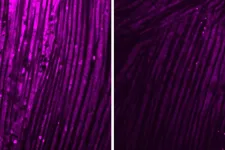(Press-News.org) In recent years, tree-planting campaigns have been underway in the United States, especially in cities, as part of climate mitigation efforts.
Urban forests can help improve air quality, generate cooling effects, and provide green spaces for outdoor recreation while also serving as an ecological habitat.
Just last year, the U.S. Forest Service announced a $1 billion campaign to expand access to trees and green spaces throughout the country, including in cities.
But a new Dartmouth-led study finds that some areas within urban forests in the U.S., may be more capable than trees growing around city home lawns in adapting to a warmer climate.
The findings are published in Frontiers in Ecology and the Environment.
The researchers were especially interested in understanding the various tree species in cities and correlations between native biodiversity and capacity for tree species to adapt to climate change in terms of water usage and tolerating droughts.
These implications are relevant given that droughts and water shortages in the U.S. are projected to become more frequent in the future.
Using previously published National Science Foundation (NSF) project data from six cities on how land-use changes have made urban areas similar—in Boston, Baltimore, Los Angeles, Miami, Minneapolis-St. Paul, and Phoenix, Arizona—the researchers analyzed tree and shrub species in large public parks with natural areas that were relatively unmanaged and residential yards. They also analyzed reference sites representing the native ecosystems of the region that have been replaced by urban landscapes. Each of the cities represents a different ecological biome, or community of plants and animals, in a particular climate.
When the researchers compared the tree species across the three land-use types within each of the cities, they found that species in parks and natural areas were more drought-tolerant and reflected greater native biodiversity than those in people's yards.
Most of the tree species found in residential yards were not only non-native, which can lead to species invasion in natural ecosystems, and were also low in drought tolerance and therefore may not be able to survive warmer temperatures expected in the future.
Prior research has found that approximately 30% of the land area in the U.S. is residential land, illustrating that trees planted in yards comprise a large percentage of the trees in an urban forest.
"There has been a lot of emphasis on tree planting in cities but what people are planting in their yards may not necessarily be sustainable in our warming climate," says lead author Giselle Mejía, a postdoctoral fellow in the Department of Environmental Studies at Dartmouth. "In terms of sustainability standards, we recommend planting trees that are more diverse, more native, and also more climate adaptable in the future."
"Planting trees that are drought tolerant and require less water than other species is something that should be considered," says Mejía.
This is already the case for especially dry cities like Phoenix and Los Angeles, which had the most drought-tolerant species in parks and reference sites than any of the other biomes.
Trees in the hottest cities, Los Angeles, Miami, and Phoenix, had the most species with low water-use capacity in addition to drought tolerance. These included the widely planted native species Cornus florida (flowering dogwood) and Magnolia grandiflora (southern magnolia) and non-native species, also known as introduced species, Pyrus calleryana (callery pear) and Schinus terebinthifolius (Brazilian pepper).
"We need to understand the characteristics that people are looking for when they choose a tree to plant in their yard, so that educational platforms and incentives can be created to help get people on board with planting trees that would benefit all of us and potentially adapt to future climate change," says Mejía.
###
END
Study examines urban forests across the United States
Researchers find trees in parks are more drought-tolerant than species near homes
2024-07-12
ELSE PRESS RELEASES FROM THIS DATE:
2023 Rolling Hills Estates landslide likely began the winter before
2024-07-12
Key takeaways
Landslides triggered by intense rainfall can sometimes be predicted along with incoming storms, but dry-season landslides often take people by surprise.
The July 2023 Rolling Hills Estates landslide that destroyed 12 homes seemed to come out of nowhere, but new research shows it began as early as December 2022.
Researchers are developing a database that will enable scientists to plug in new data to monitor potential landslides in real time and possibly predict them.
Californians are familiar with landslides that occur around storms, when saturated soil and ...
Rutgers researchers spot potential hazard with private well water treatment
2024-07-12
Systems designed to treat arsenic in private well water may be malfunctioning and endangering the health of people who count on them to keep their water safe, according to Rutgers researchers.
Megan Rockafellow-Baldoni, an assistant professor of environmental and occupational health and justice at the Rutgers School of Public Health, together with co-authors including Rutgers alum Steven Spayd, a retired research scientist formerly with the New Jersey Department of Environmental Protection, tested the water of 62 New Jersey homes with whole-house arsenic-removing water treatment systems. Their study was ...
When to trust an AI model
2024-07-12
CAMBRIDGE, MA – Because machine-learning models can give false predictions, researchers often equip them with the ability to tell a user how confident they are about a certain decision. This is especially important in high-stake settings, such as when models are used to help identify disease in medical images or filter job applications.
But a model’s uncertainty quantifications are only useful if they are accurate. If a model says it is 49% confident that a medical image shows a pleural effusion, then 49% of the time, the model should be right.
MIT ...
Research shows gamified investment sites have risks for novice investors
2024-07-12
TORONTO - What happens when online investment trading platforms start to resemble games that keep people playing for hours, with badges and exploding confetti to reward investors for their engagement?
For those who know what they’re doing, it won’t make much of a difference. New research from the University of Toronto engaging nearly 1,000 volunteers in artificial investment scenarios shows that more informational features such as price change notifications might even help savvy investors execute ...
Specially equipped natural killer cells show effectiveness against the most common form of ovarian cancer
2024-07-12
RESEARCH SUMMARY
Study Title: CAR memory-like NK cells targeting the membrane proximal domain of mesothelin demonstrate promising activity in ovarian cancer
Publication: Science Advances
Dana-Farber Cancer Institute authors include: Rizwan Romee, MD, senior author; and Mubin Tarannum, PhD, KhanhLinh Dinh, and Juliana Vergara, MD, MMSc, co-first authors
Summary: Natural killer, or NK, cells endowed with memory-like abilities and armed with a novel chimeric antigen receptor (CAR) have generated encouraging results in experiments in epithelial ovarian cancer ...
Entering the golden age for antibody-drug conjugates in gynecologic cancer
2024-07-12
“We are optimistic that the incorporation of ADCs into the treatment of aggressive tumors and treatment refractory gynecologic cancers will improve quality of life and survival outcomes in our patients.”
BUFFALO, NY- July 12, 2024 – A new editorial paper was published in Oncoscience (Volume 11) on May 20, 2024, entitled, “Entering the golden age for antibody-drug conjugates in gynecologic cancer.”
In this new editorial, researchers Michelle Greenman, Blair McNamara, Levent Mutlu, and Alessandro D. Santin from Yale University School of Medicine discuss gynecologic cancers. Biologically aggressive ...
Judge: Texas university must release records on research study that resulted in deaths of dozens of animals
2024-07-12
SAN ANGELO, Texas —Tom Green County District Court Judge Barbara L. Walther ruled Thursday, July 11, 2024, that Angelo State University must release public records relating to an experiment conducted on dozens of mice that resulted in the animals’ unnecessary suffering and death, reportedly to study the impact of the foster care system on human children.
The ruling overturns Texas Attorney General Ken Paxton’s Nov. 17, 2022 decision to side with the university in denying the records.
On July 13, 2023, the Physicians Committee for Responsible Medicine, a Washington, D.C. based health advocacy group of more than 17,000 doctor members that encourages higher standards ...
UMass Amherst food scientist rises to the challenge of giving marbled fatty feel and taste to plant-based meat
2024-07-12
One of the challenges of creating realistic-looking and delectable plant-based meat is mimicking the marbled effect of animal fat that many carnivores expect and enjoy.
A University of Massachusetts Amherst food scientist has a plan to tackle this quandary by developing new technology supported by a $250,000 grant from the Good Food Institute. The not-for-profit think tank promotes plant-based alternatives to meat, dairy and eggs, as well as cultivated “clean meat” grown from animal cells in a facility.
The technology proposed ...
Complex impact of large wildfires on ozone layer dynamics unveiled by new study
2024-07-12
In a revelation that highlights the fragile balance of our planet's atmosphere, scientists from China, Germany, and the USA have uncovered an unexpected link between massive wildfire events and the chemistry of the ozone layer. Published in Science Advances, this study reveals how wildfires, such as the catastrophic 2019/20 Australian bushfires, impact the stratosphere in previously unseen ways.
The ozone layer, a crucial shield protecting life on Earth from harmful ultraviolet (UV) radiation, has been on a path to ...
Brain inflammation triggers muscle weakness after infections
2024-07-12
Infections and neurodegenerative diseases cause inflammation in the brain. But for unknown reasons, patients with brain inflammation often develop muscle problems that seem to be independent of the central nervous system. Now, researchers at Washington University School of Medicine in St. Louis have revealed how brain inflammation releases a specific protein that travels from the brain to the muscles and causes a loss of muscle function.
The study, in fruit flies and mice, also identified ways to block this process, which could have ...
LAST 30 PRESS RELEASES:
Antifibrotic drug shows promise for premature ovarian insufficiency
Altered copper metabolism is a crucial factor in inflammatory bone diseases
Real-time imaging of microplastics in the body improves understanding of health risks
Reconstructing the world’s ant diversity in 3D
UMD entomologist helps bring the world’s ant diversity to life in 3D imagery
ESA’s Mars orbiters watch solar superstorm hit the Red Planet
The secret lives of catalysts: How microscopic networks power reactions
Molecular ‘catapult’ fires electrons at the limits of physics
Researcher finds evidence supporting sucrose can help manage painful procedures in infants
New study identifies key factors supporting indigenous well-being
Bureaucracy Index 2026: Business sector hit hardest
ECMWF’s portable global forecasting model OpenIFS now available for all
Yale study challenges notion that aging means decline, finds many older adults improve over time
Korean researchers enable early detection of brain disorders with a single drop of saliva!
Swipe right, but safer
Duke-NUS scientists identify more effective way to detect poultry viruses in live markets
Low-intensity treadmill exercise preconditioning mitigates post-stroke injury in mouse models
How moss helped solve a grave-robbing mystery
How much sleep do teens get? Six-seven hours.
Patients regain weight rapidly after stopping weight loss drugs – but still keep off a quarter of weight lost
GLP-1 diabetes drugs linked to reduced risk of addiction and substance-related death
Councils face industry legal threats for campaigns warning against wood burning stoves
GLP-1 medications get at the heart of addiction: study
Global trauma study highlights shared learning as interest in whole blood resurges
Almost a third of Gen Z men agree a wife should obey her husband
Trapping light on thermal photodetectors shatters speed records
New review highlights the future of tubular solid oxide fuel cells for clean energy systems
Pig farm ammonia pollution may indirectly accelerate climate warming, new study finds
Modified biochar helps compost retain nitrogen and build richer soil organic matter
First gene regulation clinical trials for epilepsy show promising results
[Press-News.org] Study examines urban forests across the United StatesResearchers find trees in parks are more drought-tolerant than species near homes


